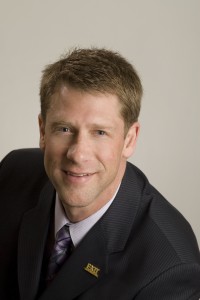Four Powerful Insights from the Talented Craig Witt
Recently Judy spent some time with a great team of brokers from EXIT Realty. So we thought this the perfect time to do re-share a great interview we had with Craig Witt, President of the U.S. Division of EXIT Realty. He is strong, impassioned, and has some incredible insights that brokers today really need to hear.
Here’s what we learned…
Q: Hi Craig – thanks so much for joining our Broker Success Series of articles! Can you start by telling us a little about yourself?
A: I currently serve as a Divisional President for the North Central Division of the United States for EXIT Realty. I have been with EXIT for over 13 years; first starting as a franchisee in Northern Michigan, then purchasing the Regional rights for Michigan, and ultimately becoming a Divisional President. My background is quite entrepreneurial as I have owned several companies prior to EXIT, mostly in the land development and construction industry.
Q: What trends are you seeing in our industry right now that you think brokers should really get in front of BEFORE the beginning of the new year and why?
A: In my opinion, and fortunately for our industry, Real Estate is largely and will continue to be a people business. As such, so is brokerage. Real Estate agents should be treated as the assets of the corporation and it all begins with strong leadership. In order to thrive in brokerage today, attracting the best talent with the right attitude, welding them into your office through a retention mechanism, then training them to be successful is key. The idea of a “body shop” mentality and more is better in my opinion really affects our industry in that many good agents slip through the cracks, burnout, and experience failure. By creating an environment where agents want to work, get the attention and the systems they need and are making a great living in an industry they are proud of is key to a successful brokerage. Quite simply, brokers should focus on getting, keeping and growing great agents.
Q: Brokers come in all shapes and sizes — so we know there aren’t any one-size-fits-all solutions, but there are some tried-and-true strategies for building a great team, can you share your top few with us?
A: There are in fact several ways to build a strong team but it all starts with the ultimate goal of the agent interested in forming one. Why? Why do you want a team, can you lead other people, and ultimately, what is your goal? By answering the tough questions in the beginning and setting a plan in place, you will either choose to build or stay on your own with perhaps a licensed assistant. Leverage is the key to creating wealth and if agents desire to have flexibility in their schedule, growth opportunity, unlimited earning potential and ultimately an exit strategy to their careers, a properly structured team can provide much of that. I see a lot of really good agents that are strong in sales and weak in admin or marketing so by picking good talent and plugging them into these areas can help them focus on their strength. Pay structure is always an interesting component, and if not handled properly, agents will outgrow the team and either leave to go on their own or be hired away by a competitor. My advice is to start with the end in mind; make a plan, do a SWOT analysis on yourself, pick the right talent with personality, then skill (you can teach skill), then pay them well and review the team structure annually.
Q: What would be your best advice to a brand new recruiter?
A: This is easy for me. First off, we should stop using the word recruit; it can have a negative connotation and I believe we have evolved away from that term. No one wants to be recruited, but we all want to be invited and welcomed. In my opinion, you cannot sell until you have been sold. What I mean is if you are going to have a recruiter represent you, it is imperative you get them passionate about your company vision and goals. At EXIT, we share our story and the impact our model can have to improve others’ lives and their own; we paint the picture for them where they can see they can be part of something bigger. First impressions mean everything and nobody wants to be sold…or recruited, they want to be exposed to something better for themselves and their family. Changing companies is extremely personal and emotional and often takes time to build the relationship. Nobody cares how much you know until they know how much you care. This person is a direct reflection of your company when they are talking to others. Role-play with them so you are confident you know what they are saying on the phone. Also, ensure they understand what you are trying to build in your office with regards to personality and culture, and make sure they are paid well. You don’t want a recruiter recruiting out of desperation, just as we don’t want our agents selling out of desperation. Keep them focused on the mission of the office and building a great place to work with great talent, and the money will come. Good recruiters are hard to find and harder to keep, weld them in and don’t be cheap.
Q: I love that line! Best advice to those who’ve ‘been around the block’ but aren’t quite at the level they want yet?
A: Re-evaluate your career, where you work and your life. Are you where you want to be? Sometimes great agents are working somewhere that is preventing them from excelling. I believe agents can be a product of the environment where they work. For example, lack of leadership, training or sense of belonging can affect the performance of most agents. At EXIT, our model provides an “arm-in-arm” culture where we work collectively to get the most and the best out of each other like a good family would. By providing the right leadership and culture, agents feel like they belong. A little peer pressure goes a long way as well within an office; not ego and strong competition but peer pressure.
I am a firm believer in hiring a coach, not a friend, a coach. Someone that is removed from you personally and emotionally. In order for a coach-student relationship to work, there needs to be accountability and mutual respect. Most people don’t want a coach because they don’t want to be told what to do. This is a major mistake in that coaches don’t necessarily tell you what to do, they hold you accountable to what you told them you were going to do. Effective coaching is helping you determine where you want to go, then guiding you to accomplish these goals through consistent and sometimes painful accountability. Broker/owners of offices are not exempt here; in order to build and sustain a successful brokerage, owners should have a coach as well or at a minimum a focus group that can help identify concerns and trends and keeps them being a focused leader for the agents. Oh, and don’t be cheap, a good coach will increase your production and make you more effective.
Q: Thanks so much again for your insights. If readers want to connect with you or learn more about your organization – where is the best place to find you?
A: To connect with me or for more information about EXIT Realty, you can email me at cwitt@exitrealty.com, connect at www.craigwitt.com, or visit www.exitrealty.com,
If you’re ready to move your team or organization in a new direction, put systems in place that position you to build the team you really want, or learn more strategies for working smarter, not harder, bookmark our blog, and join The Profitable Recruiter today. We have a full spectrum of membership benefits with all the tools, strategies and solutions you need to position yourself to win this year and every year. Our goal is for you to become the “turn-to” broker in your area for every agent.
Join today and take advantage of our special offer of 35% off with the promo code PLAN35 any pro membership. That’s 35% off everything you need to be in the right place at the right time when the agents you want are ready to make a move – including SEVEN HOURS of recruiting audio training! What are you waiting for? When you join – you and up to 10 managers can access your account! Try it for a month and see what it can do for you.



